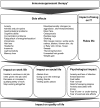Patient survey to identify reasons for non-adherence and elicitation of quality of life concepts associated with immunosuppressant therapy in kidney transplant recipients
- PMID: 26834463
- PMCID: PMC4716768
- DOI: 10.2147/PPA.S96086
Patient survey to identify reasons for non-adherence and elicitation of quality of life concepts associated with immunosuppressant therapy in kidney transplant recipients
Abstract
Background: Renal transplantation (RT) is considered the treatment of choice for end-stage renal disease compared to dialysis, offering better health-related quality of life (HRQoL) and higher survival rates. However, immunosuppressants are essential for the long-term survival of kidney grafts and patients' non-adherence to their medication leads to poor outcomes. Immunosuppressants can also significantly alter patients' HRQoL because of their side effects and the complex chronic medication regimen they represent.
Purpose: To elicit key concepts related to adherence to immunosuppressant therapy (IT) and reasons for non-adherence in terms of patient reported outcomes, side effects, and the impact of the medication on HRQoL in RT population, including patient preference of once daily over twice-daily immunosuppressive regimen. Results were used to develop an IT-specific conceptual framework and provide suggestions for improving patients' adherence to IT.
Materials and methods: Interviews were conducted with three clinical experts to determine key concepts related to RT and immunosuppressants. Thirty-seven participants in four focus groups were asked to cite important concepts related to adherence and impact of IT on HRQoL and to rate them. Qualitative analysis was conducted to code participants' responses.
Results: Non-adherence among participants where admitted was unintentional. The reason for this included forgetfulness, interference with lifestyle, being asleep at the time the medication should be taken, change in routine, and impact of side effects. Overall, participants reported that the evening dose was more problematic to remember and that the exclusion of this dose could make them more adherent. Participants also reported that IT impacted on their HRQoL in a number of ways including: placing restrictions on their lifestyle, causing anxiety, or impairing their ability to work.
Conclusion: This study provides qualitative evidence about the barriers to IT adherence and the components of HRQoL that are important from the perspective of RT patients. The developed conceptual framework of IT-HRQoL in RT transplants, including social, psychological, and work life domains, can be used to inform the development of a new IT-specific measure of HRQoL in RT patients for use in head-to-head clinical trials or observational studies. Despite limitations associated with the number and the age range of patients recruited, this study suggests that a change in the regimen from twice-daily to once daily among other measures could improve their adherence to IT and their HRQoL by placing less restrictions on their lifestyles.
Keywords: PRO; QoL; adherence; conceptual framework; immunosuppressant; renal transplantation.
Figures

References
-
- Port FK, Wolfe RA, Mauger EA, Berling DP, Jiang K. Comparison of survival probabilities for dialysis patients vs cadaveric renal transplant recipients. JAMA. 1993;270:1339–1343. - PubMed
-
- Constantiner M, Cukor D. Barriers to immunosuppressive medication adherence in high-risk adult renal transplant recipients. Dial Transpl. 2011;40:60–66.
-
- Denhaerynck K, Dobbels F, Cleemput I, et al. Prevalence, consequences, and determinants of nonadherence in adult renal transplant patients: a literature review. Transpl Int. 2005;18:1121–1133. - PubMed
LinkOut - more resources
Full Text Sources
Other Literature Sources

